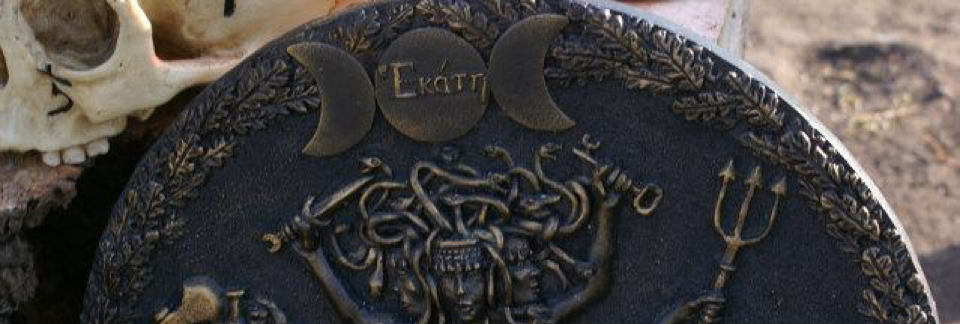Last weekend I had the honor of spending time with a wonderful group of like minded individuals. The purpose of this meeting of minds was to celebrate the Goddess Hekate. Of the many subjects that were discussed around the fire was whether honey should be used in ritual considering the current worldwide crisis in the honey bee population.
For anybody who isn’t aware, there is a deep concern regarding the bee population, with whole colonies dying off or disappearing, the ecological effect of which is potentially disasterous for world agriculture; recently the Independant (Full Article Here) stated that:
“Most of the pollination for more than 90 commercial crops grown throughout the United States is provided by Apis mellifera, the honey bee, and the value from the pollination to agricultural output in the country is estimated at $14.6bn (£8bn) annually. In Britain alone, pollination by bees of a suite of just 10 crops, ranging from apples and pears to oilseed rape, was calculated to be worth £165m per annum in 2007.”
The causes for the dramatic decrease in population of this humble little creature are varied, from viruses, to mites, increased numbers of natural predators, pesticides and even mobile phones. Apiarists in the UK are petitioning Defra to spend £8 million pounds to conduct urgent research (Proposal in PDF Here) into these issues in an attempt to save bee population in the United Kingdom. Something which Defra says they cannot afford to do.
The knee jerk reaction of those who have more than a passing interest in environmental issues, is, most understandably, a desire to boycott honey and honey related products, a not insignificant sacrifice for anybody who works with Hekate, especially those who are starting out on thier path, for these products are a staple offering and eucharistic substance. But why is this?
Possibly one of the most well known and visually powerful evokations of the Goddess occurs in Book 3 of Apollonius of Rhode’s Argonautica (a.k.a Jason and the Golden Fleece). Medea a Priestess of Hekate instructs Jason as to how to enlist the help of the Goddess.
“wait for midnight which divides the night in two. Bathe in the stream of a river which is never still and, alone, without others, dress in dark robes and dig a circular pit. Over it slit the throat of a female sheep and burn it whole, heaping high a pyre on the very edge of the pit. Make appeasement to Hekate, the only born daughter of Perses, by pouring in libation from a cup the works of bees in their hives”
The libation is undeniably a honey based substance, and whenever I am contacted by somebody wanting to work with Hekate, honey and or mead is one of the first items I list. So imagine my discomfort to hear that people I respect and consider my peers, informing me that it was no longer the done thing to use honey in ritual. So I decided to look closer into this issue and I could only come to one conclusion, it is actually my responsibility to continue to use these products, if perhaps a little more responsibly.
So why have I come to this conclusion?
Defra have donated only £2 Million of a proposed £8 Million project, the most obvious place for sourcing the remainder of this funding is within the Bee-Keeping and Honey production industry itself. Reduced demand will in theory reduce the possible available funds.
A reduced demand for honey and bee related products will have a knock on effect, fewer apiarists will be trained, thus reducing the pool of expertise in this subject and thus theoretically affecting the level of consultation between the industry and the scientist who will conduct the research.
However, I am not advocating the purchase and indescriminate use of mass produced honey. For some time now, the honey and beeswax candles I use are mostly locally sourced, in fact I see the bees from the apiary in my garden on a daily basis in the summer months, they are particulary fond of my monster lavender bushes. At a push I will purchase organic honey from the supermarket but only as a last resort and I have made the decision that I will no longer purchase mass produced mead, instead chosing to produce my own or just not use it at all.
And finally, I shall be taking a hint from Aristaios and petition his mother Cyrene.
His mother’s bidding: to the shrine he came,
The appointed altars reared, and thither led
Four chosen bulls of peerless form and bulk,
With kine to match, that never yoke had known;
Then, when the ninth dawn had led in the day,
To Orpheus sent his funeral dues, and sought
The grove once more. But sudden, strange to tell
A portent they espy: through the oxen’s flesh,
Waxed soft in dissolution, hark! there hum
Bees from the belly; the rent ribs overboil
In endless clouds they spread them, till at last
On yon tree-top together fused they cling,~ Virgil Gregorics Bk 4

We kept hives for many years, but the every-increasing bee deaths took its toll, and now we have sold our hives. So sad, but I hope Hekate will help in raising their numbers.
So do I Ccc, I have a fondness for bees, I love watching them as they fly in and out of my lavender.
Bee became my power animal in shamanic work, long before I met Hekate… and I agree with your conclusions. I shall not stop eating honey or drinking mead (I in Ethiopia, where mead is the national drink) and making my offerings. But I’ve always chosen to buy high quality products and support independent beekeepers, like the one who posted above.
Has anyone – or group – of Hekate priestesses and priests done a ritual to save the bees?